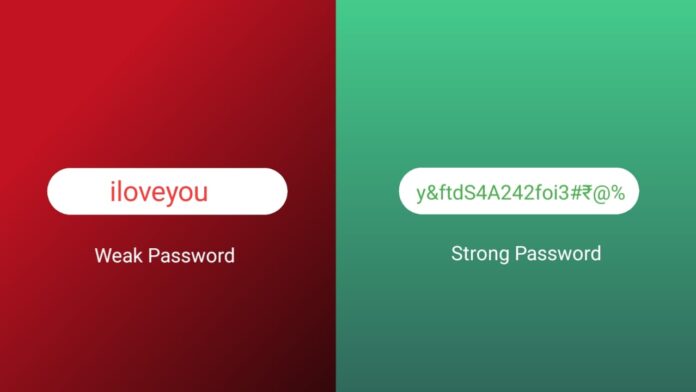
Strong Password Ideas to Boost Solid Security are crucial today. Weak, reused, or predictable passwords make cyberattacks more successful. Hackers exploit them using advanced methods like brute-force or phishing.
A single weak password can compromise many connected accounts quickly. By using long, unique, and strong passwords, risks are reduced. A safe password protects privacy, data, money, and personal identity.
Why Strong Password Ideas to Boost Solid Security Are Important
Passwords are the first defense against online threats everywhere. Emails, banking, shopping, and work accounts all need protection. A single weak password can open doors to hackers.
Statistics prove this risk: 81% of breaches involve stolen passwords. Most users have 100 accounts but reuse many passwords. Around 65% admit to repeating the same password elsewhere.
Weak Password Characteristics
Weak passwords are short, common, and easy to guess. Popular weak ones include:
- 123456
- password
- qwerty
- abc123
- iloveyou
- hello
- computer
Hackers always test such common options first during attacks. Using names, birthdays, or fictional characters makes passwords predictable. Weak choices shorten the time needed to break in.
Common Hacking Techniques Used by Attackers
Cybercriminals use several methods to steal user credentials:
- Brute-force attack: tries all possible character combinations.
- Dictionary attack: checks words against stored word lists.
- Phishing: tricks people into entering details on fake sites.
- Credential stuffing: reuses stolen passwords across platforms.
- Keylogging: records keystrokes through malware installed secretly.
These techniques highlight why strong passwords are non-negotiable today.
Why Length and Complexity Matter in Passwords
Longer passwords are always harder to crack than short ones. Eight-character passwords may be guessed in a few hours. Fifteen-character ones can take millions of years instead.
Passwords must combine uppercase, lowercase, numbers, and special symbols. Spaces are allowed and improve security significantly. Never reuse the same password across multiple accounts.
Strong Password Ideas to Boost Solid Security Techniques
There are several proven ways to create strong passwords. These techniques make them secure but still memorable for you. Complex doesn’t always mean impossible to remember if done smartly.
Shortening and Scrambling Words for Password Strength
One creative method is shortening phrases into broken forms. Example: “Laptop running free in the jungle” becomes “top ning e gle.” Add numbers, symbols, and spaces for extra safety.
Even computers need thousands of years to break it. Scrambled words confuse hackers while staying memorable for you.
Creating Unique Formulas for Password Generation
Formulas help create complex but consistent password designs. Replace letters with shifted ones, like “Cucumbers are tasty” becoming “dvdvncfst bsf ubtuz.” Another trick is turning song lyrics into acronyms.
“Shine on you crazy diamond” becomes “rsnsybccystswrcc.” Such passwords take millions of years to crack. Unique formulas mean only you understand the logic behind them.
Playing with Vowels and Spaces in Phrases
Replace vowels creatively within chosen words or sentences. Example: “A car is floating in a pan” becomes “e cer is floeting in e pen.” Spaces also strengthen passwords since many systems allow them.
Combining these two methods creates truly resistant passwords. These remain simple to remember but difficult for machines.
Mixing Country Codes for Memorable Security Keys
ISO country codes can form unique strong passwords. Example: “Mexico, Ireland, France, Germany, Japan” becomes “mex irl fra deu jpn.” Adding country calling codes increases complexity further: “mex54 irl353 fra33 deu49 jpn81.” Hackers need trillions of years to guess them. This method is fun, personal, and incredibly safe online.
Using Password Managers for Digital Safety
If manual creation feels complex, use password managers. They generate random, unique, and very strong passwords easily. Stored in encrypted vaults, they remain safe across devices.
They also autofill logins, saving time while ensuring security. Managers prevent password reuse and keep accounts safe consistently. Popular tools like NordPass even check for data breaches.
Strong Password Ideas to Boost Solid Security in Daily Life
Using strong passwords goes beyond creating them smartly. Each type of account deserves unique treatment for better safety. Applying strong ideas consistently strengthens your overall digital defense.
Protecting Email Accounts from Cyber Attacks
Emails control resets for almost every other platform. Weak email passwords risk all linked accounts simultaneously. Use unique, long, and complex email passwords always.
Add two-factor authentication for improved layered protection. Emails are prime hacker targets, so security must be highest.
Securing Banking and Financial Accounts
Financial accounts require maximum password protection every time. Use long, random, symbol-rich codes impossible to guess. Avoid birthdays, addresses, or personal details for banking accounts.
Always enable two-factor authentication for extra login verification. Money safety depends directly on banking password strength daily.
Safeguarding Social Media and Entertainment Profiles
Social media accounts reveal personal and private user information. Hackers exploit them for identity theft or impersonation scams. Avoid using the same password across platforms like Facebook or Instagram.
Each social account must have a unique strong code. If one platform is hacked, others should remain safe.
Protecting Work-Related Accounts and Sensitive Data
Work accounts hold confidential data and company resources. Weak passwords here can trigger large data breaches. Follow strict workplace password policies without ignoring guidelines.
Never reuse personal passwords for office systems anywhere. A strong password culture keeps company networks safe globally.
Locking Devices with Secure Personal Passwords
Smartphones, laptops, and tablets must also remain protected. Device passwords guard personal files, apps, and communication.
Avoid predictable patterns like “0000” or “1234.” Instead, mix letters, numbers, and symbols creatively. Device security adds another strong shield against cybercrime.
Password Safety Habits for Long-Term Security
Strong password creation is only the first crucial step. Long-term safety requires consistent secure habits everywhere. Adopting these practices keeps your passwords effective always:
- Never share passwords with friends, family, or coworkers.
- Avoid storing them in browsers or unsecured documents.
- Use two-factor authentication across all major accounts.
- Update passwords regularly, especially after suspected breaches.
- Stay alert against phishing emails and fake login websites.
- Trust only reputable password managers for storage and creation.
These habits ensure your strong passwords remain reliable and safe. Security is about continuous discipline, not just one-time effort.
As We Conclude
Strong Password Ideas to Boost Solid Security protect your online world. Weak, short, or reused passwords open doors to hackers quickly. By using unique, long, and complex methods, risks reduce greatly.
Password managers simplify the process while ensuring maximum safety. Combine creative ideas with responsible safety habits for strong protection. Cybersecurity begins with secure passwords, protecting your identity and data.
Strong Password Ideas to Boost Solid Security are crucial today. Weak, reused, or predictable passwords make cyberattacks more successful. Hackers exploit them using advanced methods like brute-force or phishing.
A single weak password can compromise many connected accounts quickly. By using long, unique, and strong passwords, risks are reduced. A safe password protects privacy, data, money, and personal identity.
Why Strong Password Ideas to Boost Solid Security Are Important
Passwords are the first defense against online threats everywhere. Emails, banking, shopping, and work accounts all need protection. A single weak password can open doors to hackers.
Statistics prove this risk: 81% of breaches involve stolen passwords. Most users have 100 accounts but reuse many passwords. Around 65% admit to repeating the same password elsewhere.
Weak Password Characteristics
Weak passwords are short, common, and easy to guess. Popular weak ones include:
- 123456
- password
- qwerty
- abc123
- iloveyou
- hello
- computer
Hackers always test such common options first during attacks. Using names, birthdays, or fictional characters makes passwords predictable. Weak choices shorten the time needed to break in.
Common Hacking Techniques Used by Attackers
Cybercriminals use several methods to steal user credentials:
- Brute-force attack: tries all possible character combinations.
- Dictionary attack: checks words against stored word lists.
- Phishing: tricks people into entering details on fake sites.
- Credential stuffing: reuses stolen passwords across platforms.
- Keylogging: records keystrokes through malware installed secretly.
These techniques highlight why strong passwords are non-negotiable today.
Why Length and Complexity Matter in Passwords
Longer passwords are always harder to crack than short ones. Eight-character passwords may be guessed in a few hours. Fifteen-character ones can take millions of years instead.
Passwords must combine uppercase, lowercase, numbers, and special symbols. Spaces are allowed and improve security significantly. Never reuse the same password across multiple accounts.
Strong Password Ideas to Boost Solid Security Techniques
There are several proven ways to create strong passwords. These techniques make them secure but still memorable for you. Complex doesn’t always mean impossible to remember if done smartly.
Shortening and Scrambling Words for Password Strength
One creative method is shortening phrases into broken forms. Example: “Laptop running free in the jungle” becomes “top ning e gle.” Add numbers, symbols, and spaces for extra safety.
Even computers need thousands of years to break it. Scrambled words confuse hackers while staying memorable for you.
Creating Unique Formulas for Password Generation
Formulas help create complex but consistent password designs. Replace letters with shifted ones, like “Cucumbers are tasty” becoming “dvdvncfst bsf ubtuz.” Another trick is turning song lyrics into acronyms.
“Shine on you crazy diamond” becomes “rsnsybccystswrcc.” Such passwords take millions of years to crack. Unique formulas mean only you understand the logic behind them.
Playing with Vowels and Spaces in Phrases
Replace vowels creatively within chosen words or sentences. Example: “A car is floating in a pan” becomes “e cer is floeting in e pen.” Spaces also strengthen passwords since many systems allow them.
Combining these two methods creates truly resistant passwords. These remain simple to remember but difficult for machines.
Mixing Country Codes for Memorable Security Keys
ISO country codes can form unique strong passwords. Example: “Mexico, Ireland, France, Germany, Japan” becomes “mex irl fra deu jpn.” Adding country calling codes increases complexity further: “mex54 irl353 fra33 deu49 jpn81.” Hackers need trillions of years to guess them. This method is fun, personal, and incredibly safe online.
Using Password Managers for Digital Safety
If manual creation feels complex, use password managers. They generate random, unique, and very strong passwords easily. Stored in encrypted vaults, they remain safe across devices.
They also autofill logins, saving time while ensuring security. Managers prevent password reuse and keep accounts safe consistently. Popular tools like NordPass even check for data breaches.
Strong Password Ideas to Boost Solid Security in Daily Life
Using strong passwords goes beyond creating them smartly. Each type of account deserves unique treatment for better safety. Applying strong ideas consistently strengthens your overall digital defense.
Protecting Email Accounts from Cyber Attacks
Emails control resets for almost every other platform. Weak email passwords risk all linked accounts simultaneously. Use unique, long, and complex email passwords always.
Add two-factor authentication for improved layered protection. Emails are prime hacker targets, so security must be highest.
Securing Banking and Financial Accounts
Financial accounts require maximum password protection every time. Use long, random, symbol-rich codes impossible to guess. Avoid birthdays, addresses, or personal details for banking accounts.
Always enable two-factor authentication for extra login verification. Money safety depends directly on banking password strength daily.
Safeguarding Social Media and Entertainment Profiles
Social media accounts reveal personal and private user information. Hackers exploit them for identity theft or impersonation scams. Avoid using the same password across platforms like Facebook or Instagram.
Each social account must have a unique strong code. If one platform is hacked, others should remain safe.
Protecting Work-Related Accounts and Sensitive Data
Work accounts hold confidential data and company resources. Weak passwords here can trigger large data breaches. Follow strict workplace password policies without ignoring guidelines.
Never reuse personal passwords for office systems anywhere. A strong password culture keeps company networks safe globally.
Locking Devices with Secure Personal Passwords
Smartphones, laptops, and tablets must also remain protected. Device passwords guard personal files, apps, and communication.
Avoid predictable patterns like “0000” or “1234.” Instead, mix letters, numbers, and symbols creatively. Device security adds another strong shield against cybercrime.
Password Safety Habits for Long-Term Security
Strong password creation is only the first crucial step. Long-term safety requires consistent secure habits everywhere. Adopting these practices keeps your passwords effective always:
- Never share passwords with friends, family, or coworkers.
- Avoid storing them in browsers or unsecured documents.
- Use two-factor authentication across all major accounts.
- Update passwords regularly, especially after suspected breaches.
- Stay alert against phishing emails and fake login websites.
- Trust only reputable password managers for storage and creation.
These habits ensure your strong passwords remain reliable and safe. Security is about continuous discipline, not just one-time effort.
As We Conclude
Strong Password Ideas to Boost Solid Security protect your online world. Weak, short, or reused passwords open doors to hackers quickly. By using unique, long, and complex methods, risks reduce greatly.
Password managers simplify the process while ensuring maximum safety. Combine creative ideas with responsible safety habits for strong protection. Cybersecurity begins with secure passwords, protecting your identity and data.







